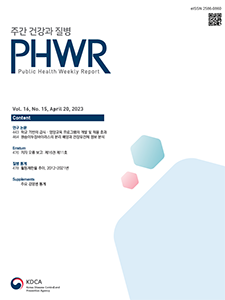Current Issue
Vol.16 No.15, April 20, 2023
-
Original Articles 2023-04-20
 0
0
 922
922
 290
290
Development and Effectiveness Evaluation of School-based Program Combined School Meal and Nutrition Education
Kumhee Son, Minji Kang, Jungwon Park, Haelim Lee, Kyung Hee Park, Dankyu Yoon, Soo Kyung Koo , Hyunjung Lim
Public Health Weekly Report 2023; 16(15): 443-463 https://doi.org/10.56786/PHWR.2023.16.15.1 Abstract
AbstractSocial and environmental factors such as families, schools, and communities are complexly involved in the growth of children and adolescents. School is one of the best places to mediate because it is a place where students live for many hours of the day and healthy lifestyles can be formed through various physical activities and school meals. Therefore, this study aimed to scientifically the effect after establishing a school-based meal intervention and nutrition education model. A program consisting of meal intervention and nutrition education was conducted for 6 months for 478 second and third graders of elementary school. The effectiveness of the program was evaluated by dividing it into three groups according to weight status. After intervention, there was a significant change in the distribution of obesity. The BMI z-score and body fat rates in the underweight and normal weight groups increased, and there was no significant change in the overweight group. The school meal intake rate increased significantly in all three groups, and some snack choices improved in terms of eating habits. Through this program, it can be used as basic data for establishing a system for the formation and growth of proper eating habits of children and adolescents and spreading and applying them in the field in the future.
-
Original Articles 2023-04-20
 0
0
 1044
1044
 267
267
Isolation and Whole Genome Analysis of Monkeypox virus from a Patient with Mpox
Minji Lee, Jin-Won Kim, Chi-Hwan Choi, Hwachul Shin, Myung-Min Choi, Sang Eun Lee, Hwajung Yi, Yoon-Seok Chung*
Public Health Weekly Report 2023; 16(15): 464-475 https://doi.org/10.56786/PHWR.2023.16.15.2 Abstract
AbstractMonkeypox virus (MPXV), a zoonotic pathogen that causes mpox (monkeypox), was endemic to Africa with sporadic outbreaks. However, since May 2022, outbreaks of mpox have occurred in non-endemic regions, including the USA and Asian countries. Between May and June 2022, the mpox test (developed in 2016 by Korea Disease Control and Prevention Agency) was precisely reevaluated for provision against the import and outbreak of MPXV-2022. Furthermore, on 11 July 2022, we completed the expansion of laboratory capacity for the diagnosis of mpox to 18 regional laboratories through education regarding the mpox test protocol and distribution of test reagents. The first case of mpox in the Republic of Korea was confirmed on 22 June 2022 using the mpox test, and the virus was isolated from the specimens of the first identified patient with mpox for electron microscopic imaging and whole genome analysis. Electron microscopic images revealed that the isolated virus had a mulberry-like appearance, which is the typical morphology of poxviruses. Moreover, whole genome sequencing confirmed that the isolated virus belonged to clade IIb lineage B.1.1 of West African origin, the currently prevalent MPXV. The isolated viruses and their genetic information may be useful not only in understanding the pathogenesis of mpox but also in developing vaccines, therapeutic reagents, and diagnostic tools against it.
-
QuickStats 2023-04-20
 0
0
 1178
1178
 255
255
Trends in the Prevalence of Limitations in Activities of Daily Living Among People, 2012–2021
Public Health Weekly Report 2023; 16(15): 478-479 https://doi.org/10.56786/PHWR.2023.16.15.4

pp. 287~325
Most Keyword
?
What is Most Keyword?
- It is the most frequently used keyword in articles in this journal for the past two years.
Most Read
-
Management of Technology Development Efforts to Enhance the Healthcare Establishment’s Infection Response Capabilities
Misuk An, Hyeyoung Lee, Se-Jin Jeong, Hojin Lee, Sunkyung Baek
Public Health Weekly Report 2026;19: 1-12 https://doi.org/10.56786/PHWR.2026.19.1.1 -
Trends in the Bystander Cardiopulmonary Resuscitation, 2014–2024
Jisu Kim
Public Health Weekly Report 2026;19: 29-30 https://doi.org/10.56786/PHWR.2026.19.1.3
Editorial Office
+82-43-719-7569





 Full Text
Full Text Cite
Cite


